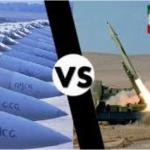
When it comes to Israel, Gaza, Russia, and Iran many Christians are decidedly in favor of Israel. There is a sense in which this is fine. After all, Christians’ support for Israelis could be considered an example of loving our neighbor.
In my last post, I laid a foundation arguing that the mission of God’s people is to make Christ known and that we do so by loving our enemies with a Christlike, self-denying, cross-bearing love.
My question is, “Why the same Christian charity is not extended to Iranians, Russians, and people of every other nation?”
You might respond by claiming that the Russians and Iranians are our enemies. But this is beside the point. Are we not called to love our enemies also? Are we not to weep with them when they suffer loss? Are we not to plead with our nation to not kill them, just as we plead with them not to kill Israelis?
The Dangerous path of loving Israel
Many Christians respond that Israel deserves special attention and favor because they are God’s chosen people.
NB: I have responded to this theologically in my book These Brothers of Mine (I am also currently writing a short book on the land titled, the Land of Contention). 
I fear that Christians’ “love for Israel” has become dangerous. It is dangerous for Israel, for the Palestinians. for Americans, Iranians, Russians, and almost every other nation.
But more than this, it is dangerous to Christ and the Kingdom
Conflating “Israel” with “Israel”
One of the dangerous elements of Christian Zionism is that the Western Church’s Israel-centrism dangerously conflates “Israel” (the Jewish people) with “Israel” (the modern nation-state).
The modern state of Israel is a secular state. The idea that Christians should love the Jewish people (which I am fine with) because they are God’s chosen people (which I would not agree with; especially when this theological conviction means that we love the Jewish people and not the Palestinians, the Iranians, or the Russians), conflates the “Jewish people” with the modern state of Israel.
The state of Israel is a nation. And nations are not perfect. They make mistakes. Supporting Israel as a state often means endorsing the policies of Netanyahu and his far-right coalition government.
Criticizing Israel
Because we have conflated “Israel” (i.e., the Jewish people) with “Israel” it has become unacceptable to criticize the state of Israel. Inside the Western Church, criticizing Israel is viewed as a sort of abandonment of our God-given responsibility to “bless” Israel. Outside the church, criticizing Israel is labeled “antisemitism.”
Criticizing someone when they do wrong is what it means to love them. Allowing someone to continue in destructive behavior is not love. It is a selfish mindset: one that is more concerned about one’s own actions and attitudes than with the object of our “love.”
This is not love. Israel’s behavior over the last 6+ months, let alone over the past few decades (they have been building settlements in the West Bank for over 55 years), is likely going to lead to its destruction.
The inability to criticize and even condemn Israel has been amply demonstrated since the acts of Oct 7.
When Israel bombs a hospital to smithereens, it is justified because Hamas is using it as a base of operations.
When Israel shut off food, water, and gas to the 2.3 million people, it is justified because they cannot allow Hamas to strengthen.
When Israel bombs a refugee camp, it is justified because a key Hamas leader was present.
When an Israeli drone hits a convoy of aid workers, it is an “accident.”
When Israel bombs the Iranian consulate in Syria (which is considered Iranian territory), we stay silent. But when Iran retaliates and bombs Israeli military bases, we are outraged.
Let me expand on the latter because it is relevant to the prospect that a regional war may break out, and I fear that many Christians in the West will endorse it.
Iran’s retaliation
In case you are unaware, on April 1st, 2024, Israel bombed the Iranian consulate in Syria. A consulate is considered foreign soil—meaning it is Iranian territory in Syria. According to reports, the attack left 16 dead: 7 members of the Islamic Revolutionary Guard Corps; 5 Iran-backed militiamen; 1 Hezbollah fighter; 1 Iranian advisor; and 2 civilians.
Iran responded by firing over 300 drones and missiles at Israel. Iran, however, only targeted military bases. In fact, the two bases that were targeted were the two bases from which Israel launched its attack on the Iranian consulate. In addition, Iran warned the international world of its impending attack well ahead of time. As a result, the only injury was to a 7 yr. old Bedouin girl who was hit by falling shrapnel after a drone was shot out of the sky.
NB: I noted on a livestream that one little girl’s injuries still matter. It matters to her, her family, and others within her community.
NBB: For those who are curious as to whether Iran’s attack on Israel is a sign of the final battle with Gog of the land of Magog from Ezek 38-39 and Rev 20, OT scholar Jace Broadhurst and I spent over an hour on a Determinetruth Livestream discussing this topic.
The point is not that Iran is the most moral army in the world (an argument that we hear regularly regarding the Israeli military). Iran’s attack, however, was justified by Article 51 of the Geneva Convention.
Israel’s attack resulted in the death of 16 people, 2 of whom were civilians.
The Media’s response to Iran’s retaliatory response
What was interesting was the media’s portrayal of the Iranian response. Western media largely ignored the fact that Iran’s attack was retaliatory. It was as if Israel had done nothing. Here is a sample of Western media outlets and their reporting of the Iranian attack:
BBC.com “Israel on high alert after unprecedented Iranian attack”. “Unprecedented”?
CBSnews.com “U.S. issues travel warning for Israel with Iran attack believed to be imminent and fear Gaza war could spread”. Do they intend to suggest that Iran is the potential cause for the spreading of the war?
CNN.com “Iran launches barrage of strikes toward Israel”. Retaliatory strikes? Apparently not.
USAtoday.com “Iran launches drones at Israel”.
FoxNews.com “Israel on high alert as Islamist regime launches drones at Israel.” Of course, Fox News had to bring Islam into the equation—as if Iran’s attack was motivated by Islamic extremism. I will give some credit to Fox News in that after I clicked on the link, the next page did note that Iran’s attack was retaliatory.
British politicians’ preposterous responses
David Cameron, a former Prime Minister of Great Britain and now the British Foreign Secretary, was asked by a reporter about Iran’s attack: “What about Iran’s frustration at having part of its sovereign territory being flattened?” Cameron responded (NB: it is part of the political world to not respond to the question that was asked, but instead to give an answer to the question that the politician wishes you had asked),
“I would argue that there is a massive degree of difference between what Israel did in Damascus and as I said 301 drones and missiles sent by the state of Iran on the state of Israel. For the first time a state-on-state attack. . . . That is a degree of difference. Reckless. . . . It shows what is the true nature of Iran.”
What does he mean, “For the first time a state-on-state attack”? Israel’s attack 2 weeks earlier was a state-on-state attack. This would be incredulous if it were not from a politician.
Mr. Cameron apparently also believes that Iran launched too many drones and missiles. Ironically, when Mr. Cameron was asked, “What would Britain do if a hostile nation flattened one of our consulates?” he replied, “We would take very strong action.” Wait a minute. Isn’t that what Iran did? Apparently, the problem is that Iran fired 300+ drones and missiles; which begs the question as to how many drones and missiles would be ok.
Mr Cameron’s response, however, was outshone in its ridiculousness by Rishi Sunak (the current Prime Minister of Great Britain).
During a meeting of the British Parliament, one of the MPs questioned why the Prime Minister never condemned Israel’s attack on Iran’s consulate, which the MP noted, “was the proximate reason for why everyone is here to discuss the question of Iran’s response.”
Mr Sunak, the PM, replied, “Whatever may have happened a few weeks ago . . .” Okay, I have to interrupt here. What? When referring to Israel’s attack on Iran’s consulate in Syria, which is considered part of Iran’s sovereign territory, he says, “Whatever may have happened. . . . “ We know what happened. Israel attacked the sovereign territory of Iran. 16 dead is what happened including 2 civilians.
But I digress.
The PM continued, “There is absolutely no justification for launching more than 300 drones and missiles at Israel. . . .” So we know what the British cabinet members did during their last meeting. “Okay, everyone. When asked about Israel’s attack on Iran we will deflect the question, or even dismiss it altogether (“whatever may have happened”) and turn our attention to Iran. Now, when it comes to Iran we have to make a big deal out of the fact that they launched more than 300 drones and missiles.”
PM Sunak then continued. “And not once did the gentlemen (the MP that questioned his actions) condemn Hamas. There is no equivalence between these actions.”
Sorry, this response is almost childish. It is like saying, “But he didn’t either.” What do you mean “he didn’t”? The MP was questioning the Prime Minister’s failure to condemn Israel’s attack. What Hamas did 6 months ago was not the topic of the debate. It is irrelevant to the present conversation.
Sadly, Iran claimed, whether this is true or not is uncertain, that Britain could have played a role in stopping Iran’s attack. Iran noted that France, Britain, and the US’s blocking of the UN condemnation of Israel’s aggression was one of the reasons why they believed they had to respond to Israel’s act of aggression.
Why does this matter?
I will respond to this point more fully in my next post. In closing, I would simply note that the West’s inability to criticize Israel is a not love for Israel but the result of a blind devotion.
And when the church gets caught amid the propaganda we often lose sight of our mission. Not only that, we do serious harm to that mission.
Our goal is to keep these posts free of charge. I do not intend to ever hide them behind a paywall. I can only do this if those of you who have been blessed by them and can afford to give ($5, $10, $25, or more/month) do so. You can give a tax-deductible contribution by following this link.
Please share this post and let others know about determinetruth.
If you wish to view this blog on your smartphone through the Determinetruth app simply download the “tithe.ly church” app on your smartphone and insert “determinetruth” as the church name you wish to follow. Once it is loaded, simply click on the “blog” icon and it will automatically load.
If you would like to have Rob speak at your church or organization in person or via Zoom, please let us know by filling out the contact info on the Contact me tab on this site.














